 Four years later, both combatants are a little more marked by the vicissitudes of time and the legal profession. Curry, 67, who has run the DA’s office for 34 years, isn’t about to concede that it’s time for him to “go play some golf,” as his challenger is suggesting. Moore, 48, says it’s time for a change in an office that’s gone stagnant under Curry’s long tenure — and she’s the new broom who can sweep clean. About 135 people turned out for the Oct. 18 debate, to eat enchiladas, applaud their respective candidates, and ask questions through moderator Gary Hardee, publisher of the Arlington Star-Telegram.
Four years later, both combatants are a little more marked by the vicissitudes of time and the legal profession. Curry, 67, who has run the DA’s office for 34 years, isn’t about to concede that it’s time for him to “go play some golf,” as his challenger is suggesting. Moore, 48, says it’s time for a change in an office that’s gone stagnant under Curry’s long tenure — and she’s the new broom who can sweep clean. About 135 people turned out for the Oct. 18 debate, to eat enchiladas, applaud their respective candidates, and ask questions through moderator Gary Hardee, publisher of the Arlington Star-Telegram.
But the event, sponsored by the local chapter of the Society of Professional Journalists, provided more than Mexican food and margaritas. Even though the names on the ballot are the same as last time around, it seems there are still hot questions and new details to be explored in this race.
During the debate, Curry touted an old public corruption case his office had handled that resulted in indictments. Afterward, he told Fort Worth Weekly that one of those targeted but not indicted was current Texas Secretary of State Roger Williams — information never made public at the time of the original case.
Moore waved a bundle of papers at Curry, which she said contained the names of more than 1,000 people charged with dangerous crimes who were back on the street because the DA’s office never got around to indicting them. Later on, in response to questions from the Weekly, she revised that figure to closer to 700.
But it was Moore’s recent defense of prominent former diving coach Wirt Norris, who’s been described by more than 20 men as the person who molested them, that stirred the most spirited arguments. Her decision to represent Norris struck many as ironic, since she made her bones as a prosecutor, in part, on a major federal child porn case.
 Regardless of the issues, the Nov. 7 election could be decided largely on factors outside the DA’s race itself. With disaffected voters pushing the candidacy of independents like Carole Keeton “One Tough Grandma” Strayhorn in the governor’s race and Democrats appearing to gain strength nationwide, Tarrant County may no longer be completely safe territory for Republicans.
Regardless of the issues, the Nov. 7 election could be decided largely on factors outside the DA’s race itself. With disaffected voters pushing the candidacy of independents like Carole Keeton “One Tough Grandma” Strayhorn in the governor’s race and Democrats appearing to gain strength nationwide, Tarrant County may no longer be completely safe territory for Republicans.
“Republicans are not going to be voting a straight ticket this year,” said Tarrant County Democratic Party Chairman Art Brender. “They’ll be picking and choosing, and we can all thank ‘Grandma’ for that.”
Whatever the outcome of this race, a new day is on the horizon for the district attorney’s office in Tarrant County — if not this year, then certainly in four years, said Jim Riddlesperger, chair of the TCU political science department. That’s what gives this race its urgency as well as a touch of poignancy, he said. It was questions over Curry’s own picking and choosing — of which cases to prosecute — that produced some of the most surprising news of the evening. Asked to name the last major public corruption case he’d prosecuted, the DA couldn’t remember one. “I don’t know that we’ve had any … in years,” he said.
“Maybe we’re just really, really good here in Tarrant County,” Moore countered. “Maybe there just aren’t any bad guys ripping off the system or stealing public money like over in Dallas. Aren’t we lucky?”
Then Curry remembered the early 1990s investigation of the Tarrant County Mental Health Mental Retardation agency. “We did investigate MHMR and got an indictment and conviction,” he told the audience, but he was short on details.
After the debate, Curry told the Weekly that Williams, a prominent local automobile dealer and long-time financial supporter of President George Bush, was one of the MHMR board members he had investigated. The day after the debate, he answered more questions by e-mail. He recounted how MHMR executive director Loyd Kilpatrick was indicted for theft by a public servant, pleaded guilty, and received a one-year probated sentence.
 A 1989 official audit report from the state MHMR agency, obtained by the Weekly, showed that Kilpatrick had taken illegal payments via a bloated compensation package he’d set up for himself with the board’s approval. The report also described how he’d rigged bids for favored vendors and how he and the board had engaged in what the report called “questionable practices” by giving “preferential treatment” to the board chairman (Williams, although the report does not name him). Specifically, the report said, the board OK’d the purchase of 31 vehicles at a cost of $352,000 from Williams’ car dealership. The report said the board failed to seek bids for the auto purchases, a violation of the agency’s bidding policies and state law and a serious conflict of interest for the board chairman.
A 1989 official audit report from the state MHMR agency, obtained by the Weekly, showed that Kilpatrick had taken illegal payments via a bloated compensation package he’d set up for himself with the board’s approval. The report also described how he’d rigged bids for favored vendors and how he and the board had engaged in what the report called “questionable practices” by giving “preferential treatment” to the board chairman (Williams, although the report does not name him). Specifically, the report said, the board OK’d the purchase of 31 vehicles at a cost of $352,000 from Williams’ car dealership. The report said the board failed to seek bids for the auto purchases, a violation of the agency’s bidding policies and state law and a serious conflict of interest for the board chairman.
County records show that Williams, appointed to the MHMR board by the Tarrant County commissioners in 1981, resigned that position on Dec. 18, 1989 — ll days after the report was placed in commissioners’ hands. The auditors recommended that commissioners “provide the District Attorney of Tarrant County with information contained in the report” for an investigation into possible criminal activities. Kilpatrick was the only person prosecuted, and there is no record that any money was ever repaid.
Curry declined to comment further on the decisions made in the case. Williams did not return calls seeking comment, nor did anyone in the secretary of state’s office.
If the choice in the DA’s race came down to who might be the most likely to stay awake for the next four years, the winner would clearly be Moore. During the debate, Curry seemed tired, melancholy, and at times simply bored. He sat slumped on his stool, his glum, deeply lined face never lit by a smile.
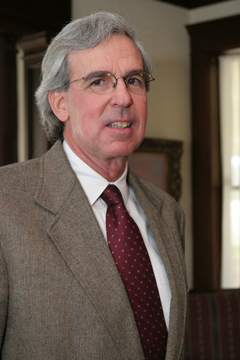 During the campaign four years ago, his “man of constant sorrow” demeanor was laid to the 1999 death of his second wife, Sunny Dickson Curry. He has since remarried but still wears a mantle of sadness. Curry touted his three decades of experience in heading up what he calls the “largest law firm in Tarrant County,” which today has 155 lawyers, a total staff of 325, and a budget of more than $30 million. His conviction rate is high, he said, and he’s got the know-how to bring in grant money, pointing to his establishment of the narcotics task force in the late 1980s with a $1 million federal grant.
During the campaign four years ago, his “man of constant sorrow” demeanor was laid to the 1999 death of his second wife, Sunny Dickson Curry. He has since remarried but still wears a mantle of sadness. Curry touted his three decades of experience in heading up what he calls the “largest law firm in Tarrant County,” which today has 155 lawyers, a total staff of 325, and a budget of more than $30 million. His conviction rate is high, he said, and he’s got the know-how to bring in grant money, pointing to his establishment of the narcotics task force in the late 1980s with a $1 million federal grant.
Some of his answers to specific questions were confused, but his political barbs were sharp, made more so by his dead-pan delivery. “I have no problem with Terri defending the worst pedophile this town has ever seen,” he said, referring to Norris. “She has every right to do that.” Pause. “But it seems hypocritical for someone who prosecuted child pornographers.” As for his own office’s failure to prosecute Norris during the more than 40 years when, according to court testimony, he was sexually abusing boys, Curry said, “Well, we did prosecute him, and I put the head of my criminal division, Alan Levy, on the case.”
(Accusations against Norris, 78, were first published by the Weekly in 2003. He pleaded guilty last year to a reduced charge of indecent exposure in one case, is on probation for 10 years, and will be a registered sex offender for life.)
Moore was unapologetic about joining Norris’ defense team. She was also energetic, youthful-looking, kept her back straight, looked directly at the audience, and smiled often. “Read the Constitution,” she said. “Every accused person in this country is entitled to a defense, and a vigorous one. … It’s the bedrock of our system. As a prosecutor, I welcomed a good defense attorney. It made me do my job right.”
When the debate finally moved on to the broader criminal issues that a district attorney must deal with and who is best qualified to run an office that has the power to alter the lives of thousands as well as the law enforcement landscape across the county, Moore clearly had the challenger’s traditional clean-slate advantage. As Curry supporter Daryl Coffey said, “Tim brings 34 years of public baggage with him.”
That baggage was laid out by Moore in a litany of accusations. She charged that Curry oversees a “good old boy system” that protects his powerful friends and their families when they get in trouble, prosecutes only the cases that won’t hurt his conviction record, covers up DWI arrests of his staff, personally has stayed out of the courtroom for the last 25 years, and has put too many people accused of violent crimes back on the street because of his office’s failure to act.
Curry, not exactly bleeding but pretty bruised, countered by accusing Moore of lying about his record and exaggerating her own record of accomplishments when she worked for him. For instance, he said, he started the gang unit, not Moore, as she claims.
At one point, Moore showed the crowd an inch-thick stack of papers that she said contained the names of more than a thousand people charged with dangerous crimes who were released because the DA’s office never got around to indicting them. (She has quoted the 1,000 figure in several appearances but later had to revise it downward.) Curry wasn’t surprised — Moore had sprung the list on him at the Arlington League of Women Voters debate two nights before — but he objected.
“That’s just not true,” he said. “Most of the cases she’s showing are drug cases that can’t be proven by lab results.” And if the evidence can’t be verified by lab analysis, Curry won’t indict. “We don’t want to be another Dallas,” he said, referring to the Dallas police scandal of five years ago, when that city sent a slew of Hispanics to jail or deported them to Mexico based on falsified evidence, including “cocaine” that turned out to be powdered gypsum.
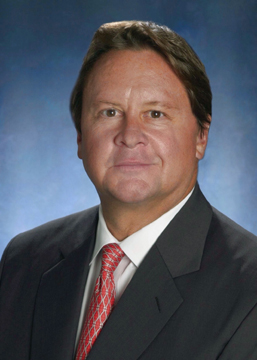 Moore said that the DA’s office has 90 days to indict if a person has been arrested and is still in jail, which Curry confirmed. If there is no indictment in the approved time, the person must be released on his or her own recognizance until there’s an indictment or a dismissal, she said. Moore said her review of the documents show that the count is actually 693 perpetrators who have been arrested for violent crimes over the past two years but have not been indicted and are back on the streets “with no supervision” from the courts because they had to be released on their own recognizance. She said the charges range from capital murder to child sexual abuse.
Moore said that the DA’s office has 90 days to indict if a person has been arrested and is still in jail, which Curry confirmed. If there is no indictment in the approved time, the person must be released on his or her own recognizance until there’s an indictment or a dismissal, she said. Moore said her review of the documents show that the count is actually 693 perpetrators who have been arrested for violent crimes over the past two years but have not been indicted and are back on the streets “with no supervision” from the courts because they had to be released on their own recognizance. She said the charges range from capital murder to child sexual abuse.
In his e-mail reply, Curry said Moore is either a “liar or she doesn’t know the law.” He said his review of the cases show that many of the offenders listed on the county’s justice information database that Moore was using are still within the 90-day limit and that “almost all” of the others, including those accused of sex offenses against children, were released on bond, which means they are under the court’s supervision, contrary to Moore’s charges.
She stands by her charge. “These lists show a huge backlog of cases,” she said. “One of the first things I’m going to do if I’m elected is clean up all those unindicted cases.”
Mansfield Police Department Chief Steve Noonkester agrees with Moore. He said many of those cases are from his town and other small towns around the county. “We can’t get a lot of our cases prosecuted for whatever reason, and we’re pretty frustrated,” he said, adding that he’s known and worked with both Moore and Curry for years.
But Noonkester said it’s a topic that comes up more and more now with his fellow law enforcement colleagues outside Fort Worth — that is, how hard it is to get cases accepted by Curry’s office even when they are slam dunks. In one case, Noonkester said, his officers arrested a man on a charge of assault with a deadly weapon, after he was involved in a fight in which a second man almost bled to death from a gaping 5-inch wound in his thigh. Noonkester’s officers “got the guy who did it and he confessed,” the chief said. But when he filed the case with the DA’s office, it was turned down for prosecution because there was a disagreement between the defendant and witnesses over whether the man had used a knife or a broken soft-drink can to cut his victim.
“What difference does it make?” Noonkester asked, frustration still in his voice after two years. “I had a confession, witnesses, and pictures of the wound, which was horrendous. I told the DA’s office that if that cut had been on the guy’s neck, he’d have been dead. Would he have accepted it then?” But prosecutors are still refusing the case, and Noonkester’s still got a violent guy loose in his town. “It’s pretty discouraging,” he said. “And I don’t have a clue as to why this is happening.”
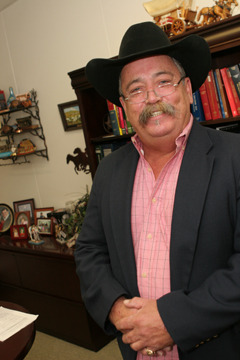 County Criminal Court Judge Daryl Coffey defends Curry as one of the best DA’s in the state. He points to Curry’s 90 percent conviction rate as proof of his efficiency in managing the department.
County Criminal Court Judge Daryl Coffey defends Curry as one of the best DA’s in the state. He points to Curry’s 90 percent conviction rate as proof of his efficiency in managing the department.
Several of Curry’s innovations, such as separate units for DWI, domestic violence, and economic crimes, are now pretty standard across Texas, the judge said. “Tim’s units are still the best in the state.”
Coffey also dismisses the idea that Curry’s prosecutorial decisions are slanted toward his friends and associates. When Coffey first came to Fort Worth 25 years ago, he said, “Tim hired me on merit. Hell, I didn’t have any political pull in those days.” Coffey worked in Curry’s office for five years and never saw any favoritism being dished out, he said.
Ironically, in a place where many in the audience had downed a cold one or two, one of the hottest moments of the debate came when Moore asked Curry how many of his own staff members had been arrested for drunk driving. To his credit, Curry didn’t dodge the question. “Over 30 years, there’s been a half-dozen or so who’ve gotten in that kind of trouble,” he said. “We have a big department.” And did he fire them? Some, he said; others he helped rehabilitate.
“This is a unique type of government,” Moore said, “and we have to lead by example. Maybe if their boss wasn’t out drinking and driving …”. She didn’t finish her sentence. Curry interrupted in his only show of emotion that night. “I have never been arrested for DWI,” he said, loudly and firmly.
Curry has said that he quit drinking about five years ago, but his earlier habits have long haunted his career. It wasn’t exactly a state secret that Curry and much of the courthouse crowd hung out for years at the now-closed Albatross bar on the old Jacksboro Highway. It was widely rumored that more deals were cut there than in the courtrooms. In fact, Curry owned a half interest in the Albatross when he decided to run for the DA’s office in 1972; he sold his interest when he won.
Curry declined to be interviewed for this story, but four years ago he talked candidly about the subject. “I drank in those earlier days,” he said. “I never did drink on the job, only after hours.” And he never drove after a night of drinking. “Drinking and driving is illegal,” he said.
However, a few years ago, Brett Shipp, an investigative reporter with WFAA-TV/Channel 8, tailed Curry’s car on several work days, following him to bars and videotaping him driving away in his car. Shipp did not enter the bars or film him taking a drink.
 More recently, Shipp’s been on the DA’s case again, this time involving allegations of favored treatment for a friend. Late last year, Shipp reported that Mansfield police chief Noonkester was angered over what the chief called “favored treatment” by Curry’s office. A woman was arrested by one of his officers after she allegedly tried to fill a forged prescription for hydrocodone, a controlled narcotic. The woman is a family member of Curry’s long-time secretary, Noonkester told Shipp. Curry, according to the news report, recused himself from the case and hired a special prosecutor, Fort Worth attorney Bill Ray.
More recently, Shipp’s been on the DA’s case again, this time involving allegations of favored treatment for a friend. Late last year, Shipp reported that Mansfield police chief Noonkester was angered over what the chief called “favored treatment” by Curry’s office. A woman was arrested by one of his officers after she allegedly tried to fill a forged prescription for hydrocodone, a controlled narcotic. The woman is a family member of Curry’s long-time secretary, Noonkester told Shipp. Curry, according to the news report, recused himself from the case and hired a special prosecutor, Fort Worth attorney Bill Ray.
Ray then quietly dismissed the charges after the woman promised to check into a county rehab center. Judge Wayne Salvant, who oversees the center, told Shipp that he’d never heard of anyone’s drug charges being dismissed until after they had completed the program. “If you’re asking me do I think this would be the way a normal case would be handled for John Q. Citizen …? No,” Noonkester told Shipp.
Curry told the Weekly by e-mail that the case had not been dismissed and that the woman had in fact been indicted in June.
Noonkester said Ray told him that the woman did not complete the rehab program, and he had no choice then but to reinstate the case and to indict her. “I stand by my statements to Shipp,” Noonkester said. “It was dismissed the first time around. You and I would not have received that kind of easy treatment.”
Back at the debate, Curry was asked about the ethics of his office intervening on behalf of the city of Fort Worth after the city was sued “over Cabela’s TIF.” Curry frowned and looked puzzled. “I don’t think I understand who Cabela’s TIF is,” he said. A ripple of laughter went through the room.
Cabela’s, of course, is the multi-billion-dollar outdoor chain store that opened with much fanfare last year near the Alliance Airport after receiving millions in tax breaks from Fort Worth through a tax increment financing district, or TIF. The highly publicized case in question was brought against the city by a group of Eastside residents trying to stop what they called a huge giveaway of taxpayer dollars. Curry’s office formerly intervened on behalf of the county, in support of the city, and assigned one of his top civil division attorneys, Ann Diamond.
“When Ann is involved in a case, she’s very thorough,” said her boss Marvin Collins, head of the district attorney’s civil division. “She would have briefed Mr. Curry, of course.” However, he said, the DA’s office was “simply acting as counsel to the county” after the Tarrant County commissioners voted to intervene in the case on the side of the city. There was little involvement, he said, besides just showing up in court.
Because the case is almost two years old and it wasn’t generated within Curry’s office, Collins said, he wasn’t surprised that his boss didn’t instantly remember it.
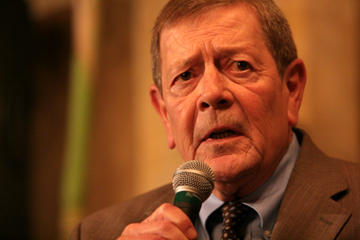 Nonetheless, Moore used Curry’s memory lapse to point out how out of touch she thinks he is with his office and staff. She will be a “hands-on” DA, she said, who will be visible in the courtroom, prosecuting “tough cases” and acting as a mentor for young, inexperienced prosecutors. She chastised Curry for not having shown up in court as a prosecutor since 1977. That was the year he personally handled the prosecution of millionaire Cullen Davis, accused of murdering his stepdaughter during the infamous violence at the Davis mansion in west Fort Worth the year before. In Amarillo, where the case was tried on a change of venue, a jury found Davis not guilty after a trial that was more circus than substance. Curry was blamed for losing the case as well as losing control of the proceedings. He has not tried a case since then.
Nonetheless, Moore used Curry’s memory lapse to point out how out of touch she thinks he is with his office and staff. She will be a “hands-on” DA, she said, who will be visible in the courtroom, prosecuting “tough cases” and acting as a mentor for young, inexperienced prosecutors. She chastised Curry for not having shown up in court as a prosecutor since 1977. That was the year he personally handled the prosecution of millionaire Cullen Davis, accused of murdering his stepdaughter during the infamous violence at the Davis mansion in west Fort Worth the year before. In Amarillo, where the case was tried on a change of venue, a jury found Davis not guilty after a trial that was more circus than substance. Curry was blamed for losing the case as well as losing control of the proceedings. He has not tried a case since then.
Ironically, when Curry ran and won against another long-time DA, Doug Crouch, in 1972, he made the same charge now being used against him — that Crouch was “absent from the courtroom.”
Curry made no apologies for his own absence from the courtroom, readily admitting that he had not personally tried a case in 25 years. “I am a manager,” he said. “I have a large, skilled staff of seasoned prosecutors to do the job.”
Coffey said it’s pure hogwash to try to tar Curry for not showing up in the courtroom. “He’s managing one of the largest legal offices in the state,” Coffey said, “and that’s a full-time job.”
Moore was once one of Curry’s prosecutors, highly praised by her boss when she was seen as a rising star in his office of young, aggressive lawyers. But for the last four years, she’s been on the other side of the aisle, making her living as a defense attorney after quitting her job as a federal prosecutor to run against Curry in 2002.
By then, she had 14 years of prosecutorial work under her belt, first with Curry’s office, where she worked for a decade, and then four years as an assistant U. S. attorney for the Northern District of Texas. When she filed, she expected Curry to retire. In 1998, when she left his office for the federal court after “an offer I couldn’t turn down,” she said, she told Curry that someday she wanted his job. He told her then, she said, that he would step down in 2002 and support her for the job, “with money and endorsements.” Curry, of course, didn’t quit, and in a 2002 interview he denied the conversation ever took place.
Still, that job with the feds gave her resumé a huge boost. In a case that made national headlines, Moore was lead prosecutor in 2000 against the country’s largest internet child pornography ring to date, one that was being run out of a nice little suburban house near Fort Worth by Thomas and Janice Reedy, both now serving long prison sentences. “I took folks off the street who were making a million dollars a month off the misery of children and put them behind bars,” Moore said. The Reedys had been operating their ring since 1997 through webmasters in Russia and Indonesia who were supplying customers worldwide with pornographic images of children for $29.95 per hit. Many of the victims, some as young as 4, were found through the webmasters and rescued. In some countries, the investigation is still ongoing.
Moore’s boss at that time, then-U. S. Attorney Paul Coggins, told the Weekly during the 2002 campaign that he would “put Terri’s experience at the state and federal level and match it with anyone’s in the country … . She’s tough as can be, but she has the compassion to work with victims’ groups … attributes equally important to the job.”
As an assistant DA in the late 1980s, Moore said, she founded the gang unit after “cases started coming across my desk about people dying because of the color of the clothes they were wearing. … We made gang case law back then, sending some of the deadliest criminals in this town to prison for life.” And if anyone should think that a woman wouldn’t be as tough as a man, she points to the fact that she’s the first and only woman to have served as the deputy chief of the district attorney’s criminal division, where she prosecuted and won death penalty cases and had gang members asking their lawyers if “that bitch Terri Moore” was going to prosecute them.
“Terri could have been elected to any office in this town if she’d switched parties when everyone else did and joined the Republicans,” said Coffey, a GOP stalwart and one of Moore’s admirers — but not one of her supporters.
“I’m with Tim,” the judge said. But if Terri wins, “she’ll do a fine job. She’s a great trial attorney and smart as a whip. And she would have beat Tim last time around if she’d been running as a Republican. This is just a fact of life in Tarrant County. It’s a Republican world here.” The DA’s office “ain’t broke,” Coffey said, and there’s no reason to fix it by turning Curry out now.
Chuck Noteboom thinks the DA’s office is broke, and he’s thrown his support to Moore. Noteboom, a successful personal injury lawyer who does no criminal law, wants to see a more visible district attorney. “I think I’ve seen Elvis as many times as I’ve seen our DA,” he said. Noteboom, who has been in practice here since 1977 and is active in the Tarrant County Bar Association and its charitable arm, the Bar Foundation, is ticked because Curry doesn’t actively support either group, he said. “Terri’s a charter member,” but Curry’s never joined, he said, and never shows up at their functions.
“It’s important for the local attorneys, especially the younger ones, to see the district attorney, the top elected lawyer in the county” supporting the local association and doing some mentoring, he said. “Just about every top lawyer in town, every judge in the county, and the U. S. Attorney here are active members who help raise money for the foundation — but not our DA,” he said.
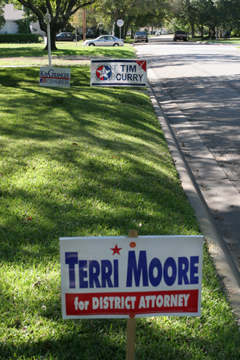 Defense attorney Leonard Schilling, a former cop who was a co-counsel with Moore on the Norris case and who seldom agrees with any judge, backed Coffey’s take on Moore’s political decision to stay with the donkeys, but he admires her for it. “Hell, yes, she’d have been elected to any office she wanted had she switched,” he said. That stubborn refusal to switch in order to win highlights her honesty, he said. “She has too much honor to change her principles just to better position herself politically.” Curry, who started in politics in 1972 as a Democrat, switched parties more than 10 years ago, as did most of the county’s elected Democratic officials.
Defense attorney Leonard Schilling, a former cop who was a co-counsel with Moore on the Norris case and who seldom agrees with any judge, backed Coffey’s take on Moore’s political decision to stay with the donkeys, but he admires her for it. “Hell, yes, she’d have been elected to any office she wanted had she switched,” he said. That stubborn refusal to switch in order to win highlights her honesty, he said. “She has too much honor to change her principles just to better position herself politically.” Curry, who started in politics in 1972 as a Democrat, switched parties more than 10 years ago, as did most of the county’s elected Democratic officials.
“Terri’s one hell of a lawyer, one of the smartest, brightest lawyers I’ve seen,” Schilling said. “She’s clearly a star, tough as nails, and smart to boot,” and by having been on both sides of the aisle, “she has a broad overview of the whole system.” And Schilling has no quarrel with the incumbent — “I got no complaints about Curry,” he said — until the question comes up about Moore’s defense of Norris. That sets his teeth on edge. “Wouldn’t it be a sad state of affairs if our justice system only worked for the nice people?” he said. Has Moore raised enough questions about Curry to send him to the golf course? Did Moore’s decision to represent Norris cost her some supporters? And finally, have other Democratic and independent candidates this season raised enough questions about Republic incumbents in Washington, Austin, and elsewhere to help Moore’s cause substantially?
Coffey says no to the last one. This is still “Republican country,” he said. “He’ll win by about the same margin he did before.” The Republicans are in trouble all over the country, the judge readily admitted, “but not here.”
Moore’s troops think otherwise. “Curry is vulnerable,” said Art Brender. It’s not about who was at the debate, he said. The voters who matter are the ones who weren’t there, the disaffected thousands who signed petitions for Strayhorn in the governor’s race, Brender said. “If Terri targets those folks, she can win, especially the women.”
Riddlesperger, the TCU prof, said he sees no clear advantage for either candidate, although it’s still an “uphill battle for a Democrat here.” One of the problems, he said, is that there has been no polling and little news coverage of the race, even though it is one of the most important in the county. “There is an incredible contrast” between Moore and Curry in style and in generational appeal, he said. “He’s more of a CEO type, delegating authority and working behind the scenes; she’s an aggressive hands-on type who’ll be very visible in that office.”
But the vast majority of voters will never see them together or hear anything as revealing as the debate at La Puertita, “and that’s too bad,” he said, because the outcome of this race could change the dynamics of Tarrant County law enforcement and politics for another 30 years — just as it did three decades ago when Curry, the young Turk of his day, turned out the old guard.
You can reach Betty Brink at bcbrink@earthlink.net.











